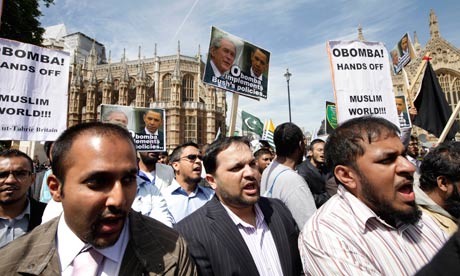CA BOUGE UN PEU CHEZ LES ROSBEEFS
PM wins row with Nick Clegg over crackdown on Muslim extremists
Counter-terrorism review insists groups must reflect British mainstream values to get funds
 Protesters from Hizb ut-Tahrir demonstrate during the recent visit by Barack Obama. The Prevent review has backed away from proscribing the group. Photograph: Lefteris Pitarakis/AP
Protesters from Hizb ut-Tahrir demonstrate during the recent visit by Barack Obama. The Prevent review has backed away from proscribing the group. Photograph: Lefteris Pitarakis/APDavid Cameron will emerge as the victor from a bitter cabinet battle over multiculturalism this week as the government unveils a hardline approach to tackling Islamist extremism.
Home Office sources say that Cameron has quashed Nick Clegg's argument for a more tolerant attitude to Muslim groups by insisting on a strategy centred upon the notion that violent extremism is incubated within the ideology of non-violent extremism.
The shift in approach will be outlined when the government's counter-terrorism strategy is unveiled by the home secretary, Theresa May, on Tuesday. Central to the Prevent strategy is a broader definition of extremism that will be extended beyond groups condoning violence to those considered non-violent but whose views, such as the advocacy of sharia law, fail to "reflect British mainstream values".
A Home Office source said: "There will be a direct challenge to these [non-violent] groups."
The Prevent review has been delayed for five months because of disagreements within the coalition cabinet. In his view that engaging with non-violent extremists can be used as a bulwark against violent extremists, Clegg has been joined by the attorney general, Dominic Grieve, the Tory chairman, Baroness Warsi, and others including Charles Farr, the head of the office of security and extremism. They argue it is crucial to maintain a distinction between violent and non-violent extremism and that it is necessary to engage rather than alienate.
Warsi, who sits on the cabinet subcommittee dealing with integration, is understood to disagree strongly with the new direction of Prevent but has been dissuaded from publicly criticising the strategy.
Among those supporting the prime minister on a crackdown on Muslim groups was the education secretary, Michael Gove, and Lord Carlile, who is in charge of the Prevent review.
Ostensibly the strategy echoes Cameron's contentious speech to an international counter-terrorism conference in Munich last February when he suggested that "state multiculturalism" had failed.
During the speech the Tory leader categorised those who espoused an ideology of Islamic extremism alongside those who supported violence. He said: "Move along the spectrum, and you find people who may reject violence, but who accept various parts of the extremist world view, including real hostility towards western democracy and liberal values."
A Home Office source said: "When a prime minister states something so unequivocally, it is unlikely they will be allowed to deviate from that."
The strategy will warn Muslim groups that they will only receive public funding under certain conditions. Groups would be allocated funding on short-term projects but only after proving they do not promote or support extremist views.
"Under the old Prevent strategy we sprayed a lot of cash willy-nilly and the new strategy is opposed to that," said the source.
Haras Rafiq, director of Centri, a counter-extremism consultancy, welcomed the strategy, but said the main challenge was implementation.
"They need to build a criteria to establish which organisation they fund has extremist views, which one doesn't, and ensure extremist groups do not receive funding from other pots."
One group, the Mosques and Imams National Advisory Board, which has links to the hardline Muslim Association of Britain, received £250,000 in the year up to April but has already had its annual public funding withdrawn, the Observer has learned.
During the Munich speech Cameron said it was "nonsense" to fund groups with extremist elements, adding: "Would you allow far-right groups a share of public funds if they promise to help you lure young white men away from fascist terrorism? Of course not."
The strategy, however, will shy away from naming groups, effectively dismissing speculation that the initiative will proscribe non-violent, extremist Islamist groups such as Hizb ut-Tahrir, a step which Cameron has publicly supported but which legal sources advise is not possible.
The Conservative manifesto named Hizb ut-Tahrir as a group it wanted to proscribe; in 2009 the then shadow home secretary, Chris Grayling, promised to "immediately ban" the group if the Tories were elected.
The strategy to be unveiled this week will explain that the issue of funding groups that promote community cohesion will be left to the Department for Communities and Local Government. Sources say that under the previous system community groups had to apply for support from counter-terrorism funding, which succeeded only in stigmatising them.
!!!!!!!!!!!!!!!!!!!!!!!!!!!!!!!!!!!!!!!!!!!!!!!

Aucun commentaire:
Enregistrer un commentaire